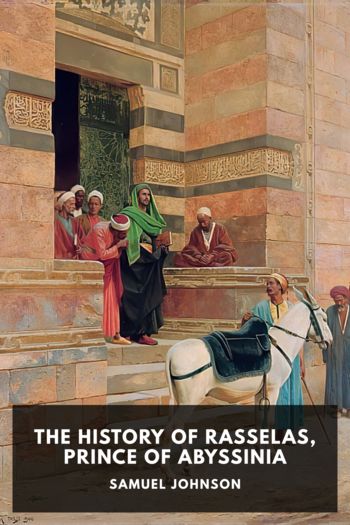The History of Rasselas, Prince of Abyssinia - Samuel Johnson (best novel books to read .TXT) 📗

- Author: Samuel Johnson
Book online «The History of Rasselas, Prince of Abyssinia - Samuel Johnson (best novel books to read .TXT) 📗». Author Samuel Johnson
“Variety,” said Rasselas, “is so necessary to content, that even the Happy Valley disgusted me by the recurrence of its luxuries; yet I could not forbear to reproach myself with impatience when I saw the monks of St. Anthony support, without complaint, a life, not of uniform delight, but uniform hardship.”
“Those men,” answered Imlac, “are less wretched in their silent convent than the Abyssinian princes in their prison of pleasure. Whatever is done by the monks is incited by an adequate and reasonable motive. Their labour supplies them with necessaries; it therefore cannot be omitted, and is certainly rewarded. Their devotion prepares them for another state, and reminds them of its approach while it fits them for it. Their time is regularly distributed; one duty succeeds another, so that they are not left open to the distraction of unguided choice, nor lost in the shades of listless inactivity. There is a certain task to be performed at an appropriated hour, and their toils are cheerful, because they consider them as acts of piety by which they are always advancing towards endless felicity.”
“Do you think,” said Nekayah, “that the monastic rule is a more holy and less imperfect state than any other? May not he equally hope for future happiness who converses openly with mankind, who succours the distressed by his charity, instructs the ignorant by his learning, and contributes by his industry to the general system of life, even though he should omit some of the mortifications which are practised in the cloister, and allow himself such harmless delights as his condition may place within his reach?”
“This,” said Imlac, “is a question which has long divided the wise and perplexed the good. I am afraid to decide on either part. He that lives well in the world is better than he that lives well in a monastery. But perhaps everyone is not able to stem the temptations of public life, and if he cannot conquer he may properly retreat. Some have little power to do good, and have likewise little strength to resist evil. Many are weary of the conflicts with adversity, and are willing to eject those passions which have long busied them in vain. And many are dismissed by age and diseases from the more laborious duties of society. In monasteries the weak and timorous may be happily sheltered, the weary may repose, and the penitent may meditate. Those retreats of prayer and contemplation have something so congenial to the mind of man, that perhaps there is scarcely one that does not purpose to close his life in pious abstraction, with a few associates serious as himself.”
“Such,” said Pekuah, “has often been my wish, and I have heard the Princess declare that she should not willingly die in a crowd.”
“The liberty of using harmless pleasures,” proceeded Imlac, “will not be disputed, but it is still to be examined what pleasures are harmless. The evil of any pleasure that Nekayah can image is not in the act itself but in its consequences. Pleasure, in itself harmless, may become mischievous by endearing to us a state which we know to be transient and probatory, and withdrawing our thoughts from that of which every hour brings us nearer to the beginning, and of which no length of time will bring us to the end. Mortification is not virtuous in itself, nor has any other use but that it disengages us from the allurements of sense. In the state of future perfection to which we all aspire there will be pleasure without danger and security without restraint.”
The Princess was silent, and Rasselas, turning to the astronomer, asked him whether he could not delay her retreat by showing her something which she had not seen before.
“Your curiosity,” said the sage, “has been so general, and your pursuit of knowledge so vigorous, that novelties are not now very easily to be found; but what you can no longer procure from the living may be given by the dead. Among the wonders of this country are the catacombs, or the ancient repositories in which the bodies of the earliest generations were lodged, and where, by the virtue of the gums which embalmed them, they yet remain without corruption.”
“I know not,” said Rasselas, “what pleasure the sight of the catacombs can afford; but, since nothing else is offered, I am resolved to view them, and shall place this with my other things which I have done because I would do something.”
They hired a guard of horsemen, and the next day visited the catacombs. When they were about to descend into the sepulchral caves, “Pekuah,” said the Princess, “we are now again invading the habitations of the dead; I know that you will stay behind. Let me find you safe when I return.”
“No, I will not be left,” answered Pekuah, “I will go down between you and the Prince.”
They then all descended, and roved with wonder through the labyrinth of subterraneous passages, where the bodies were laid in rows on either side.
XLVIII Imlac Discourses on the Nature of the Soul“What reason,” said the Prince, “can be given why the Egyptians should thus expensively preserve those carcases which some nations consume with fire, others lay to mingle with the earth, and all agree to remove from their sight as soon as decent rites can be performed?”
“The original of ancient customs,” said Imlac, “is commonly unknown, for the practice often continues when the cause has ceased; and concerning superstitious ceremonies it is vain to conjecture; for what reason did not dictate, reason cannot explain. I have long believed





Comments (0)